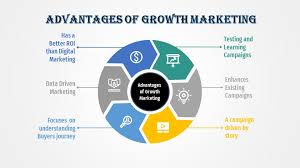Marketing Growth Strategy: A Key to Business Success
In today’s competitive business landscape, having a well-defined marketing growth strategy is essential for companies looking to expand their reach and increase revenue. A solid marketing plan not only helps attract new customers but also retains existing ones, driving sustainable growth over time.
Understanding Your Target Audience
The first step in developing a successful marketing growth strategy is understanding your target audience. By conducting market research and analysing customer demographics, behaviours, and preferences, you can tailor your marketing efforts to effectively reach and engage potential customers.
Setting Clear Objectives
Setting clear and measurable objectives is crucial for tracking the success of your marketing initiatives. Whether it’s increasing brand awareness, generating leads, or boosting sales, defining specific goals allows you to focus your efforts and evaluate the impact of your strategies.
Utilising Multiple Marketing Channels
Diversifying your marketing channels can help maximise your reach and engage with a broader audience. From digital marketing tactics such as social media advertising and email campaigns to traditional methods like print ads and events, leveraging multiple channels can amplify your message and drive growth.
Embracing Data-Driven Insights
Utilising data-driven insights is key to refining your marketing strategies for optimal results. By analysing metrics such as conversion rates, customer acquisition costs, and ROI, you can identify trends, make informed decisions, and continuously improve the effectiveness of your campaigns.
Cultivating Customer Relationships
Building strong relationships with customers is essential for long-term business growth. By delivering exceptional customer experiences, providing valuable content, and engaging in two-way communication, you can foster loyalty and advocacy among your target audience.
Adapting to Market Trends
In today’s fast-paced business environment, staying agile and adapting to market trends is critical for maintaining a competitive edge. By monitoring industry developments, consumer preferences, and emerging technologies, you can adjust your marketing strategies accordingly to stay ahead of the curve.
In conclusion, developing a comprehensive marketing growth strategy is vital for driving business success in an increasingly dynamic marketplace. By understanding your audience, setting clear objectives, utilising diverse channels, leveraging data insights, nurturing customer relationships, and staying adaptive to change, you can position your company for sustainable growth and continued prosperity.
Understanding Marketing Growth Strategies: Key Questions and Insights
- What are the four growth strategies in marketing?
- What are the 4 marketing growth strategies?
- How do you develop a marketing growth strategy?
- What are the 7 steps of marketing strategy?
- How do you write a marketing growth strategy?
- What is an example of growth strategy?
What are the four growth strategies in marketing?
In marketing, there are four key growth strategies that businesses often employ to expand their market presence and increase revenue. These strategies include market penetration, market development, product development, and diversification. Market penetration focuses on selling more of existing products to current customers or entering new markets with existing products. Market development involves targeting new customer segments or geographical areas with existing products. Product development entails creating and introducing new products to meet the evolving needs of customers. Diversification is the strategy of entering new markets with new products to reduce risk and explore additional revenue streams. By understanding and effectively implementing these growth strategies, businesses can strategically drive their marketing efforts towards sustainable expansion and success.
What are the 4 marketing growth strategies?
When exploring marketing growth strategies, businesses often inquire about the four key approaches that can drive expansion and success. These strategies typically include market penetration, market development, product development, and diversification. Market penetration involves increasing sales of existing products in current markets, while market development focuses on entering new markets with existing products. Product development entails creating new offerings for current markets, and diversification involves introducing new products to new markets. Understanding and effectively implementing these four marketing growth strategies can significantly impact a company’s growth trajectory and competitive positioning in the market.
How do you develop a marketing growth strategy?
Developing a marketing growth strategy involves a systematic approach to expanding a company’s market presence and increasing its revenue streams. To create an effective strategy, businesses must first conduct thorough market research to understand their target audience and competitive landscape. Setting clear, measurable objectives is crucial in determining the direction of the strategy and evaluating its success. Utilising a mix of marketing channels, such as digital platforms and traditional methods, can help reach a wider audience and drive engagement. Data-driven insights play a significant role in refining strategies based on performance metrics and consumer behaviour analysis. Cultivating strong customer relationships through personalised experiences and continuous communication is key to sustaining growth. Adapting to market trends and being agile in response to changing dynamics ensures that the strategy remains relevant and effective in driving business success over time.
What are the 7 steps of marketing strategy?
When it comes to developing an effective marketing growth strategy, understanding the seven key steps can provide a solid framework for success. These steps typically include market research to identify target audiences and competitors, setting clear objectives to guide marketing efforts, defining a unique value proposition to differentiate the brand, developing a comprehensive marketing plan that utilises various channels, implementing strategies to reach and engage customers effectively, measuring and analysing performance metrics to track success, and continuously adapting and refining the strategy based on insights gained. By following these seven essential steps in marketing strategy development, businesses can create a roadmap for sustainable growth and competitive advantage in today’s dynamic marketplace.
How do you write a marketing growth strategy?
Developing a marketing growth strategy involves a systematic approach to outlining a plan that aims to expand a company’s market presence and increase its revenue over time. To write an effective marketing growth strategy, start by conducting thorough market research to understand your target audience and industry trends. Define clear and measurable objectives that align with your business goals, such as increasing brand awareness or driving sales. Utilise a mix of marketing channels, both digital and traditional, to reach a wider audience. Analyse data to track the performance of your strategies and make informed decisions for continuous improvement. Cultivate strong customer relationships by delivering value and engaging with your audience. Stay agile and adapt to market trends to ensure the long-term success of your marketing growth strategy.
What is an example of growth strategy?
An example of a growth strategy in marketing is implementing a customer referral programme. By incentivising existing customers to refer new clients to your business, you can tap into a valuable source of leads and expand your customer base. This strategy not only helps increase sales but also fosters loyalty among your existing customers, who are more likely to recommend your products or services to others. Additionally, a well-executed referral programme can enhance brand awareness and credibility, driving sustainable growth for your business in the long run.






